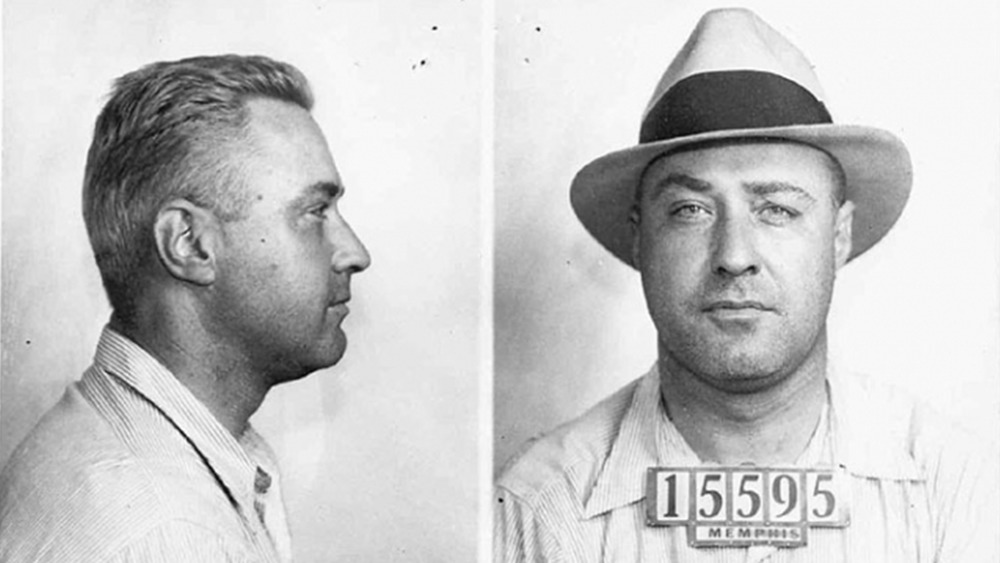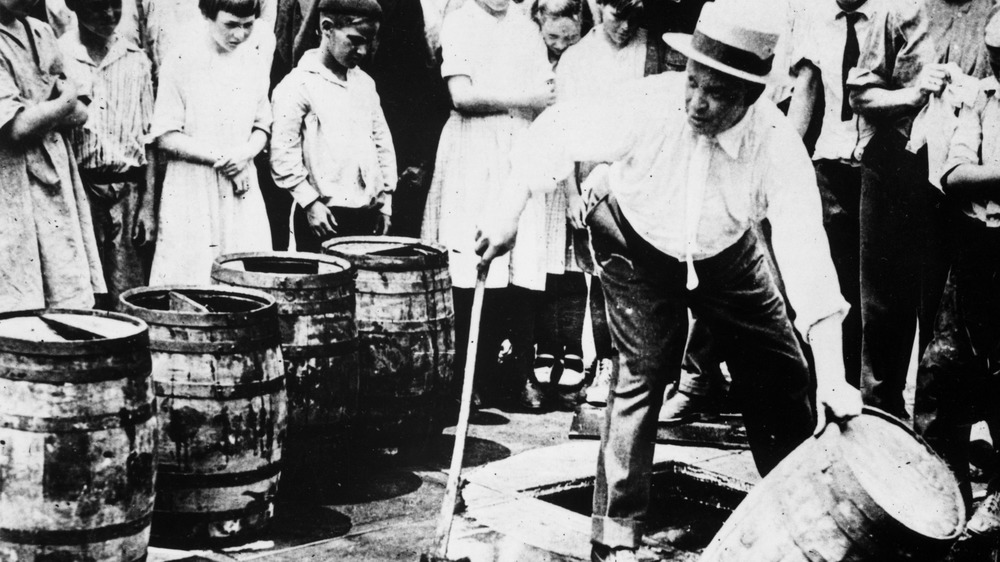The Original Machine Gun Kelly Wasn't A Musician
Machine Gun Kelly has made headlines. He's also reinvented his reputation, thanks to the woman in his life. Machine Gun Kelly was also sent to Alcatraz. Yeah, this is not about the rapper Machine Gun Kelly, but rather the notorious criminal Machine Gun Kelly.
Kelly, born George Kelly Barnes in 1895, started his life of crime as a bootlegger. He was the last person you'd think would become a criminal. Born to a relatively wealthy family in Memphis, Tennessee, he even went to college at the Mississippi State University (some records said he went to Mississippi A&M), said the Crime Museum. College wasn't a picnic for Kelly, and he started to hang out with a bad crowd. At 19, he married Geneva Ramsey and had two children. Unable to find a job, Kelly decided to turn to bootlegging in the time of prohibition, explained Biography. Ramsey divorced him, citing he ran with bad company. After his divorce, Kelly became entrenched in the life of crime.
In 1927, Kelly was arrested for selling illegal liquor and spent a few months in a New Mexico jail. Then he was arrested again and sent to Leavenworth Federal Penitentiary in Kansas, where he met other bank robbers such as Frank Nash, Francis Keating, and Thomas Holden. It's rumored that Kelly helped Keating and Holden escape prison. By the time he was released in 1930, he had met the woman who would change his life: his second wife, Kathryn Thorne.
The birth of Machine Gun Kelly
Thorne was already an experienced criminal when she met Kelly. The Crime Museum said Thorne possibly murdered her third husband (George was her fourth), but the judge ignored all evidence and never charged her. It was Thorne who decided Kelly needed rebranding. Despite helping break out notorious bank robbers, Kelly was still mostly known as a minor criminal. Thorne bought a Thompson submachine gun, made Kelly pose with it, and started marketing him. She told him to practice firing the weapon in their backyard, even though Kelly was not a fan of firearms. He became Machine Gun Kelly to the public.
Thorne reportedly sold bullet casings from Kelly's gun as souvenirs to help increase his notoriety. The two robbed banks in Texas, Iowa, and Washington. Since it was the Depression, the banks were running out of money. Kelly, Thorne, and their associate Albert Bates hatched a plan: Why not turn to kidnapping? Their target was Oklahoma oilman Charles Urschel. They asked for a $200,000 ransom — about $4 million today.
Kelly and Bates entered the Urschel house on July 22, 1933. The FBI Museum writes that instead of one man, they found two. Urschel and his wife were playing bridge with Walter Jarrett and his wife. Not knowing who was who, the kidnappers took both men. After identifying Jarrett, they released him. They drove to Thorne's mother and step-father's farm. But, even though he was blindfolded, Urschel proved to be an astute witness.
But was he more like a pop gun?
After holding Urschel at the farm for a few days and receiving cash for ransom, the oilman was released. He then told the FBI everything. He heard background noises, smelled gas from the outside, and counted minutes from turning before stopping, giving the investigators enough information to track down the kidnappers.
The FBI raided the Paradise, Texas ranch. Kelly and Thorne had left for Memphis. There FBI agents cornered them, with Kelly caught without a weapon, and arrested them. Their trial was one of the first at which film cameras were allowed. The kidnapping case itself proved important. It was the first after kidnapping was made into a Federal crime, and the first major case solved by the FBI's new director, J. Edgar Hoover.
The jury found Kelly, Thorne, Bates, and Thorne's mother and step-father guilty. Kelly was sentenced to life imprisonment and sent to Alcatraz. Despite hanging with big leagues in the jail, Kelly was mocked and nicknamed "Pop-Gun." Biography said he was a model prisoner, very different from his public persona and the reputation Thorne had carved out for him with her tall tales about his criminal life.
After 17 years, Kelly was returned to Leavenworth Prison, where he died of heart failure in 1954 on his 59th birthday. Even though he turned out to be less violent, his reputation preceded him. And that's why rappers call themselves Machine Gun Kelly, after the notorious bootlegger, bank robber, and failed kidnapper.


